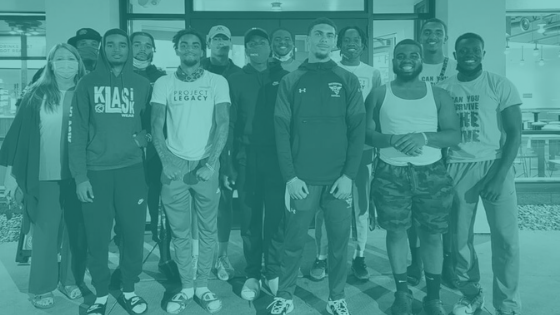They can't do it alone. We can't do it alone.
70% of the students in Legacy Scholars have experienced homelessness in their lives.
Along with this, data also shows us that close to 70% of high school students experiencing homelessness read below grade level in state reading assessments. 80% are below grade level in mathematics. We also know that on average, black families represent 54% of families living in homeless shelters.
Project Legacy has, for years, supported young people experiencing the barriers above.
We have worked with kids as early as middle school, and have seen the effects of these experiences on their lives. But what we learned over time is that the barriers presented by trauma, generational poverty and lack of support do not stop when a child turns 18. Moving into young adulthood means these same kids with the same experiences are fighting to pave a better path, just with fewer options and less support.
We are working to change this.
Our Legacy Scholars program is designed to support first generation college students in our community who are enrolled and attending college. Our program focuses on contributing to their wellbeing so they can succeed mentally, emotionally, physically, spiritually - and academically.
Although this program just began our second year, we are working to establish a 100% graduation or transfer rate of those who are involved in the Legacy Scholars program, compared to the current RCTC graduation rate of 9% and transfer rate of 28%.
So how do we do this?
Through the Legacy Scholars program, we work to establish trust and emotional connections with our students. We believe this is the foundation for the rest of our work.
We work around the clock, providing both office hours at RCTC, and 24/7 on-call crisis support when it is needed by our young participants.
We teach financial literacy so these students can budget their money wisely and make informed financial decisions. Each student develops a budget with staff that is updated every other month.
We assist them with financial aid, troubleshoot and solve barriers. We help them obtain needed information for the FAFSA and their taxes. We teach them how to accept loans and the basics of debit, credit and debt.
We obtain permission from each student to communicate with their teachers, coaches and financial aid staff. We monitor their grades every week. We meet with students, arrange tutoring sessions with trained volunteers, and maintain relationships with people in our community willing to help.
For students who had IEPs in high school, we make sure students know they are entitled to receive college accommodations. Because our Executive Director is a special education educator by profession, she is often able to identity learning difficulties that might not have been identified in high school and assist with getting the needed assessments and interventions in place in young adulthood.
Our work also centers around collaborating with organizations in our community, making best use of the resources and programs available to youth and young adults.
We work with the Workforce Development Center to assist young people with their career goals and to provide opportunities. We work with The Reading Center to provide assessments to students to identify and address dyslexia. Last year, support from our donors allowed us to cover over $2,000 in reading assessments and tutoring for students who had never before received services.
This year, we have worked with staff at Health Access MN to make sure that each of our students have health insurance. This wonderful program is often not used because there are so many barriers for youth to enroll. But as a result of connecting youth to this program, each of our students is covered and receiving needed health and dental care.
We help enroll every eligible student in EBT and pick up food from Channel One for those without transportation.
We work with Dr. Sky Smith at Livewell Counseling Center to consult on the mental health needs of our youth and provide trauma-informed therapy to young people, and work with Doc’s Recovery House to help us navigate issues related to substance use and addiction that many of our young people face.
We couldn’t do this alone.
We don’t do this alone.
Our work is made possible because of those on our team who dedicate their lives to this work, because of the organizations that come alongside us, and the donors and community members who say “yes” to the opportunity to offer help and financial support.
Today, will you say yes?
Please consider partnering with us in this live-saving, round-the-clock work by making a monthly contribution today.

